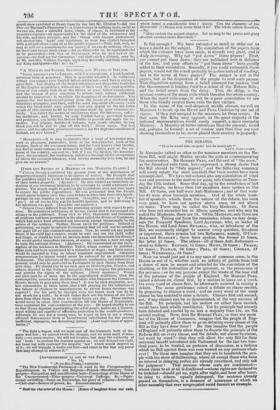THE DEBATES.
" Then he would talk—ye gods ! how he would talk !"
LEE'S ALEXANDER.
IF Alexander talked as often as the nominee members on the Re- form Bill, well might Statira invoke the gods in commemorating his conversation. Sir ROBERT PEEL, and the rest of " the crew," as the Standard calls them, have expressed a strong desire that the Bill should be " fully argued ;" and the following summary will surely satisfy the most sceptical that their wishes have been accomplished. We have not entered into any calculation of what was said previous to the motion for going into Committee on Tues- day the 12th instant. Since that day, up to the conclusion of last night's debate, no fewer than 180 members have spoken on the Bill. Of these, one half were Anti-Reformers ; and of that num- ber 66 were close borough members. Out of the whole num- ber of speakers, which, front the nature of the debate, has been very- great, 83 have not spoken above once, 80 not above six times. These may be called the Very Moderate. Of those who have not exceeded ten or fifteen speeches, and who may be called the Moderate, there are 15. Of the Moderate, only three are Reformers. Taking out from the remainder, whom we may desig- nate the Frequent Speakers, Lord ALTHORP, who, as leader of the House, and Lord JOHN RUSSELL, who, as introducer of the Bill, are necessarily obliged: to answer every question, frivolous or important, there remain bid two Reformers, namely, O'CoN- NELL and STANLEY; these have spoken, the former 21 times, the latter 21 times. The others—all of them Anti-Reformers- stand as follows: SUGDEN, 18 times; HUNT, 20 times ; . PRAED, 22 times ; PELHAM, 28 times ; PEEL, 48 times; CROIER, 57 times ; WETHERELL, 58 times!
Now we would just put it to -any man of common sense, in the House or out of it, whether such an infinity of gabble from half a dozen of men be meant and intended for the conviction of the doubting, or the instruction of the ignorant, or the persuasion of the perverse ; or for any purpose except the waste of the time and of the patience of the people of England. Sir ROBERT PEEL raised a debate on clause first, by a motion to leave out a word. On every word of clause first, he afterwards assisted in raising a debate. The same gentleman raised a debate on clause second, by proposing to change a word ; and on every word of the same clause he has assisted to raise a debate. Clauses first and second, are, if any clauses can be so denominated, of the very essence of the Bill. Its principle, had his motion on either been carried, would have been wholly annihilated. Yet its principle had already been debated and carried by no less a majority than 136, on the second reading. Now, does Sir ROBERT PEEL, or does any mem ber of the House of Commons, imagine that the people of Eng- land will patiently allow them to go on debating every clause of the Bill as they have done these ? Do they imagine that the people of England will patiently allow them to dispute the principle of the Reform Bill on every clause; and the details, not clause by clause, but word by word ?—that they will allow the only Bill for their universal benefit introduced into Parliament for the last two hun- dred years, to he treated, on pretence of discussion, in a fashion which no Bill against them was ever treated on any pretence what- ever ? Do theSe men imagine that they are to hoodwink the peo- ple with the show of deliberating, where all except those who have an interest in delaying justice,are already convinced, and only ask for Judgment ? That persons whose seats are condemned— whose claim to sit at all is disallowed—whose rights are declared to be forfeited—should get up, night after night, and hour after hour, to delay to others, equally delinquent, the sentence already passed on themselves, is a measure of assurance of which no other assembly that ever congregated could furnish an example. -


























 Previous page
Previous page